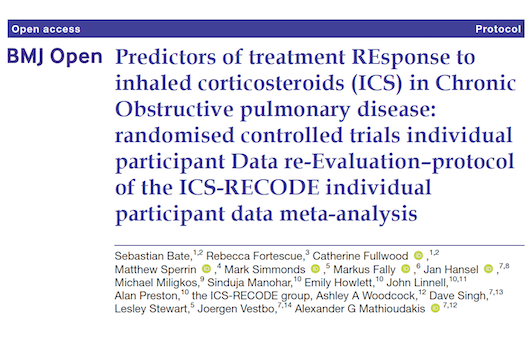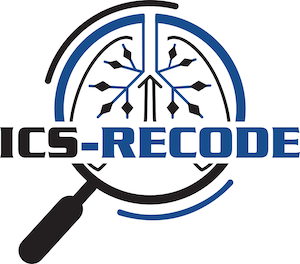
We are pleased to share our recently published study protocol for ICS-RECODE in BMJ Open (link to full text). In this project, we aim to refine the use of inhaled corticosteroids (ICS) in the management of Chronic Obstructive Pulmonary Disease (COPD) by identifying which patients are most likely to benefit from this treatment while minimizing its risks.
What is the ICS-RECODE Study?
The ICS-RECODE study stands for Predictors of treatment REsponse to inhaled corticosteroids (ICS) in Chronic Obstructive pulmonary disease: randomised controlled trials individual participant Data re-Evaluation. It is an individual participant data (IPD) meta-analysis that brings together data from 22 high-quality randomised controlled trials involving more than 50,000 participants. By pooling these data, we will assess both the safety and efficacy of ICS and explore key predictors of treatment response, such as blood eosinophil levels and other patient characteristics.
Our Approach and Key Strengths
- Robust Data Set:
We will reanalyze individual participant data from a large number of trials. This extensive dataset provides us with the statistical power to examine subtle differences in treatment responses and move toward a more personalized approach in COPD care. - Rigorous, Transparent Methodology:
Our protocol follows internationally recognized guidelines, including those from Cochrane and GRADE. We will apply a consistent analytical approach across all trials to minimize bias and ensure that our findings are both reliable and reproducible. - Patient-Centered Design:
In developing this study, we have actively involved patients, healthcare providers, and other stakeholders. This collaborative approach ensures that the outcomes we examine—such as symptom control, exercise capacity, and overall quality of life—are those that matter most to patients. - Precision Medicine Focus:
By investigating detailed patient characteristics and potential treatment modifiers, we will determine which patients are likely to benefit most from ICS. This precision medicine approach is intended to guide future COPD management strategies, making treatments both safer and more effective.
What We Will Do
In this study, we will:
- Reanalyse Data: Reexamine individual patient data from multiple RCTs to assess the impact of ICS on exacerbation rates, lung function, and other clinically relevant outcomes.
- Explore Treatment Interactions: Investigate how various patient characteristics, including blood eosinophil levels, interact with ICS treatment to influence outcomes.
- Enhance Clinical Decision-Making: Provide evidence-based insights that can help clinicians identify which patients are most likely to experience a net benefit from ICS, ultimately leading to more tailored and effective COPD care.
Our commitment is to conduct this research with the highest level of scientific rigor and transparency. We believe that the ICS-RECODE study protocol represents a significant step forward in optimizing treatment for COPD, and we look forward to sharing our findings with the broader scientific community.
For further details, the full protocol is available on BMJ Open at this link.





